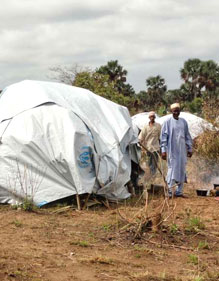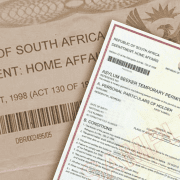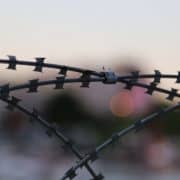|
Getting your Trinity Audio player ready...
|
 By Valencia Talane
By Valencia Talane
It’s hard to stand up to a corrupt system that works against you. It is especially challenging when you are in a foreign country and in desperate need of its services. Kazadi Mutombo* (25), from the Democratic Republic of Congo, knows all too well what it feels like to have to fight for your turn without the help of a bribe to grease the palms of public officials.
Mutombo is one of many who have found themselves at the mercy of dishonest Home Affairs officials at a refugee centre in Gauteng. They inflicted abuse on him one chilly May morning, and he believes that his refusal to take short cuts and bribe his way to asylum documentation for a relative is the reason.
This is his story:
“I arrived [at the centre] early in the morning around 6am. Outside the gate, on a big field, there were queues of people from different countries. The men and the women were put in separate queues. If you’re from different countries you’re also separated and stand according to your country’s line. If you’re from the DRC, Ethiopia or whatever, you stand in that line, so if you’re from that country they set you according to your country. That’s how it works.
“The official comes from inside the Home Affairs department and gets people. They can’t assist everyone, so they pick 30 people from each country. So the first 30 women and the first 30 men and so on. What the officials usually ask is if you want to be on top of the list and make sure your name is chosen.”
In order for an applicant to get prompt assistance, Mutombo told Corruption Watch in an interview, they would have to start bribing officials from when they first arrive at the centre. This way, they are able to jump a queue that they could otherwise spend hours, or even days in.
For those remaining in the queue, help might come much later in the day, or not at all. Applicants might have to leave the centre and return the next day with a better plan to get to the front of the queue quicker.
“For newcomers and people who are still to get their papers done, that queue is very, very bad in terms of people pushing. At some point we were inside the premises by the parking and the queue was moving very badly. People were pushing each other and we had to wait.”
During a confrontation with a security guard – which Mutombo claims started when he sought help to restore order in the queue – he was jostled and insulted, before being ordered to get back in line.
“The guard manhandled me and pushed me badly, as if to say ‘who are you to ask me’, he started yelling about people coming from other countries, and even called me a ‘kwerekwere’ [a derogatory term for foreigners]. I told him he mustn’t speak to me in that way, I let him know I was only there to assist someone else and that I already have my documents. He asked me what I was looking for if I already had documents, because I do not have the legal right to come into the building to assist anybody if I have my documents.”
The guard’s superior was summoned and when Mutombo realised that the situation would not be resolved he called the Home Affairs anti-corruption line to lodge a formal complaint, and then the police.
“When the police came, they went inside with me and I told them that those men were physically abusing me. The police officers asked for a witness, the person that I took there [his relative] to confirm, because the other people would deny it.”
All that followed was an apology from the centre’s operations manager and an assurance of better service. Mutombo and his relative were ushered inside the building where they were promised swift help. Once the police were out of sight however, the two men realised nothing much had changed in their fate.
“They left us there to be assisted by a lady and left with the security guards. Those people mistreated applicants, not only with us but with anyone around us. You couldn’t even ask where the bathroom is because they really insult you. That’s how they are. I know it’s a hard job to have but how you communicate is very key.
“We saw a lot of other foreigners and we were listening to conversations between other foreigners and officers. They are busy assisting them inside and they are like ‘no, give me some money and I’ll get your papers done quickly’. We started watching our surroundings, what’s happening.
“I thought that we were going to be assisted, we were put inside of this operations by the manager. At the end of the day it comes around to 2:30 and I see everybody is starting to shift out of the building. We asked what was going on and were told ‘these people sent way too many people, more than expected’. I decided to raise the issue with some of the security guards and they said ‘no, you must come back here tomorrow’.”
What hope is there for people like Mutombo?
Their fate is in someone else’s hands
The Department of Home Affairs (DHA) describes an asylum seeker as a person who has fled his or her country of origin and is seeking recognition and protection as a refugee in South Africa, and whose application is still under consideration.
Refugee reception centres across the country service thousands of applicants on a regular basis. In some cases, applicants camp outside the centres overnight for a good chance of getting help early the next morning. For these people, the options are few: they either wait their turn patiently under difficult conditions at these facilities, bribe their way to swift assistance, or give up the fight and risk arrest by the police on the grounds of being undocumented.
According to the Refugees Act of 1998, no person may be denied the opportunity to apply for asylum. An applicant can stay in the country until there has been a final decision on their application. Should their application not be approved, they have the right to appeal that decision. A final decision is given after all possible appeals and reviews of a negative decision have been exhausted.
An applicant who is refused asylum and has used all the channels available to them has to leave the country voluntarily or face deportation.
Refugee status is not granted to people who are just looking for a job, a business opportunity or to further their studies in South Africa. In these cases, which are also handled by the DHA, applications can be made for a work permit or a study or visitor’s visa.
People seeking refugee status in South Africa need not pay for the services rendered. Mutombo knows this fact all too well, and he believes that his only crime was to question the system used at the centre.
“I asked them ‘how can I come back to the same place, because this was my third attempt’. They said you must keep trying, in the meantime, if the police stops us and says we’re illegal here they can kick us out, even though we have come to the right department for the past three weeks without getting any help. They said ‘we don’t care, they must take you back to your country’.”
* Not his real name









